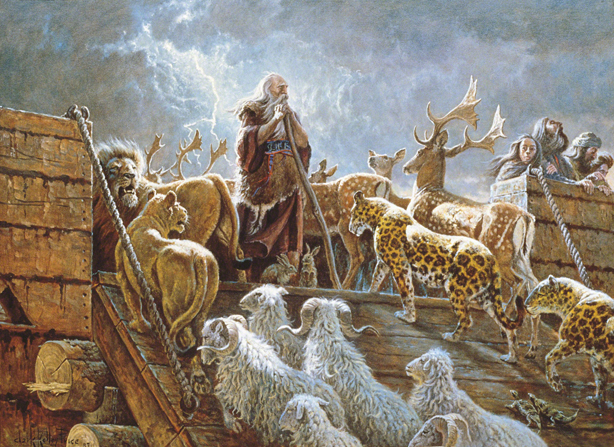 Two of the main characters in the
Torah, Noah and Moses, have the opposite life trajectory. The midrash[1] highlights the difference
as follows. Moses is described initially
as an Egyptian man. This is not
surprising, of course, given that he grew up in the house of Pharoh. Nonetheless, it is not a compliment given
Egyptian values at the time of both idolatry and enslavement. However, Moses
sheds this description over time and by the end of the Torah he is described as
a man of G-d[2]. This is a remarkable turnaround and gives us
an inkling into what type of internal work Moses did throughout his life. In contrast, Noah is not so lucky. He starts
of as a ‘righteous man’ when we first greet him at the beginning of the parsha
but he then becomes a man of the earth after he departs from the ark. While the ground has some admirable
qualities, generally an association with the earth is a sign of an existence
overly identified with physicality. What
happened? It is not entirely clear given
that Noah seems to do G-d’s bidding throughout.
Two of the main characters in the
Torah, Noah and Moses, have the opposite life trajectory. The midrash[1] highlights the difference
as follows. Moses is described initially
as an Egyptian man. This is not
surprising, of course, given that he grew up in the house of Pharoh. Nonetheless, it is not a compliment given
Egyptian values at the time of both idolatry and enslavement. However, Moses
sheds this description over time and by the end of the Torah he is described as
a man of G-d[2]. This is a remarkable turnaround and gives us
an inkling into what type of internal work Moses did throughout his life. In contrast, Noah is not so lucky. He starts
of as a ‘righteous man’ when we first greet him at the beginning of the parsha
but he then becomes a man of the earth after he departs from the ark. While the ground has some admirable
qualities, generally an association with the earth is a sign of an existence
overly identified with physicality. What
happened? It is not entirely clear given
that Noah seems to do G-d’s bidding throughout.
One commentary explains that the
difference between Noah and Moses was in the way they approached their life’s
work.[3] There are people who approach their life as a
lonely mission towards personal actualization.
The people around them are a distraction in their achieving personal excellence. In contrast, there are people that decide to
dedicate themselves’ to the well – being of the community. This comes at a tremendous self-sacrifice as
their personal time is cut by all the responsibilities. This sacrifice is real and can result in
diminished wisdom. However, the purpose
of life is the latter according to the midrash.
Moses ended his life at a higher
level of completion than Noah. Why? When
the nation of Israel faced destruction in the episode of the golden calf, Moses
went to bat for them and even told G-d to erase him from the book if Israel is
not to be saved. In contrast, Noah didn’t inspire his generation to improve or
inspire G-d to save his generation. He went into his own ark and saved himself and
his immediate family. That root of
self-centeredness, even though it came with good intentions was his downfall
later on in life. Moses, in contrast, had a root of otherness that blossomed
throughout his life and led to his greatness. While it may come at a personal
cost at times, we have to ask our-self, what are we here for in the end? If the answer is for the well-being of the community
we may find our self paradoxically more elevated.
No comments:
Post a Comment